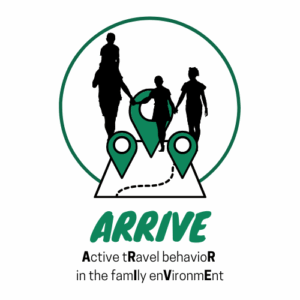ARRIVE
Active Travel Behavior in the Family Environment – ARRIVE

The ARRIVE project (Active tRavel behavioR in the famIly enVironmEnt) aims to investigate the determinants of active travel behavior among adolescents, with a specific focus on the interplay between individual characteristics, attitudes, and perceived barriers reported by both adolescents and their parents.
Active travel—such as walking, cycling, or using a scooter/skateboard as a routine form of transportation (e.g., to school or extracurricular activities)—constitutes an important domain of physical activity for adolescents. However, existing research in this field has predominantly focused on primary school children (ages 6–10), concentrated only on school travel, and typically considered either the child’s or the parents’ perspective in isolation when examining socio-ecological determinants, without leveraging the potential of integrative, family-based insights.
Qualitative studies suggest that the family environment and interactions among family members significantly influence adolescents’ participation in unstructured physical activities, including active transport.
Project Aim
The ARRIVE project seeks to develop a deeper understanding of adolescents’ active mobility to various destinations within the family context, evaluated through a social-ecological framework. The theoretical model includes individual-level factors as well as policy, physical, and social environmental determinants.
Study Design
A cross-sectional mixed-methods approach is employed:
In the quantitative component, a questionnaire based on the Conceptual Framework for the Environmental Determinants of Active Travel in Children (Panter et al., 2008) is used to collect data on adolescents’ travel behaviors and associated determinants from both adolescents and their parents.
Using the Forsa Panel, a representative sample of parents and adolescents from different regions and socio-economic backgrounds in Germany is surveyed.
The qualitative component consists of in-depth interviews exploring family decision-making processes regarding mode of transport choices, providing deeper insights into dynamics that shape active travel behavior.
The simultaneous data collection from parents and adolescents allows for a nuanced analysis of intra-family interactions and the comparison of perspectives. This innovative methodology generates a comprehensive picture of adolescents’ active mobility behavior and yields important implications for physical activity promotion in Germany.
Project Leads: Prof. Dr. Anne Kerstin Reimers (FAU Erlangen- Nürnberg), Prof. Dr. Yolanda Demetriou (Technical University of Munich)
Research Team: Dr. Isabel Marzi, Dr. Franziska Beck, Clara Tristram (FAU Erlangen-Nürnberg), Denise Renninger (Technical University of Munich)
Project Partner: Prof. Dr. Claus Krieger (University of Hamburg)
Publication List:
Beck, F., Marzi, I., Renninger, D., Demetriou, Y., Engels, S.E., & Reimers, A.K. (2023). Associations of parents‘ and adolescents‘ active travel behavior across various destinations – a sex/gender analysis. BMC Public Health, 23(1), 522. https://doi.org/10.1186/s12889-023-15428-x
Marzi, I., Beck, F., Engels, E., Renninger, D., Demetriou, Y., & Reimers, A.K. (2023). Adolescents‘ travel behavior in Germany: Investigating transport mode choice considering destination, travel distance, and urbanization. Journal of Transport Geography, 112, 103694. https://doi.org/https://doi.org/10.1016/j.jtrangeo.2023.103694
Reimers, A.K., Marzi, I., Beck, F., Engels, E., Renninger, D., Buttazzoni, A., Krieger, C., & Demetriou, Y. (2022). Active travel behaviour in the family environment: protocol for the mixed-methods cross-sectional ARRIVE study. BMJ Open, 12(2), e056383. https://doi.org/10.1136/bmjopen-2021-056383
Renninger, D., Bachner, J., García-Massó, X., Molina-García, J., Reimers, A.K., Marzi, I., Beck, F., & Demetriou, Y. (2023). Motivation and Basic Psychological Needs Satisfaction in Active Travel to Different Destinations: A Cluster Analysis with Adolescents Living in Germany. Behavioral Sciences, 13(3), 272. https://doi.org/10.3390/bs13030272
Renninger, D., Kelso, A., Reimers, A.K., Marzi, I., Beck, F., Engels, E.S., Standage, M., & Demetriou, Y. (2022). Motivation and active travel in adolescent girls and boys in Germany – findings from the ARRIVE study. Transportation Research Part F: Traffic Psychology and Behaviour, 90, 425-437. https://doi.org/https://doi.org/10.1016/j.trf.2022.09.015
Renninger, D., Reimers, A.K., Marzi, I., Beck, F., Krieger, C., & Demetriou, Y. (2023). How do adolescents experience the decision-making process on travel mode choice? Health Promotion International, 38(6). https://doi.org/10.1093/heapro/daad147
Seemüller, S., Beck, F., Tristram, C., Marzi, I., Renninger, D., Demetriou, Y., & Reimers, A.K. (2023). The role of parental environmental self-identity on active travel behavior within parent-adolescent dyads. German Journal of Exercise and Sport Research. https://doi.org/10.1007/s12662-023-00923-5.
Tristram, C., Reimers, A. K., Renninger, D., Beck, F., Demetriou, Y., & Marzi, I. (2023). Parental perspectives on the decision-making process on transport mode choice in adolescents: a qualitative study with mothers and fathers. Frontiers in Psychology, 14. https://doi.org/10.3389/fpsyg.2023.1227612